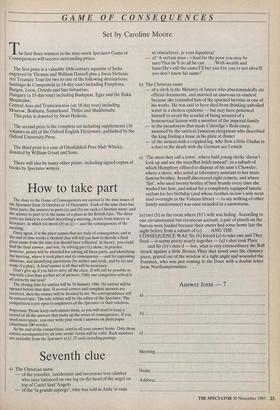GAME OF CONSEQUENCES Set by Caroline Moore
he first three winners in the nine-week Spectator Game of Consequences will receive outstanding prizes.
The first prize is a valuable 18th-century aquatint of India engraved by Thomas and William Daniell plus a Swan Hellenic Art Treasure Tour for two to one of the following destinations: Santiago de Compostela (a 14-day tour) including Pamplona, Burgos, Leon, Oviedo and San Sebastian; Hungary (a 15-day tour) including Budapest, Eger and the Bukk Mountains; Central Asia and Transcaucasia (an 18-day tour) including Moscow, Bokhara, Samarkand, Tbilisi and Shakhrisabz. This prize is donated by Swan Hellenic.
• The second prize is the complete set including supplements (16 volumes in all) of the Oxford English Dictionary, published by the Oxford University Press.
The third prize is a case of Glenfiddich Pure Malt Whisky, donated by William Grant and Sons.
There will also be many other prizes, including signed copies of books by Spectator writers.
How to take part
The clues to the Game of Consequences are carried in the nine issues of the Spectator from 19 October to 14 December. Each of the nine clues has three parts; the answers to parts (a) and (b) are each a Christian name, and the answer to part (c) is the name of a place in the British Isles. The three Parts are linked in a codicil describing a meeting, drawn from history or literature, in which (a) meets (b) at (c)— and the consequences of the Meeting.
Once again, it is the place names that are truly of consequence; and at the end of nine weeks a rhymed clue will tell you how to decode a final Place name from the nine you should have collected. In theory, you could find the final answer, and win, by solving part (c) alone; in practice, however, points will be awarded for solving all three parts, and identifying the meeting, where it took place and its consequence — and for explaining allusions, and identifying quotations (by author and work, and by act and scene if a play). A brief answer is all that will be necessary.
.Don't give up if you fail to solve all the clues. It will still be possible to Win with a less than perfect set of answers. Only one competitor solved it all correctly last year!
The closing date for entries will be 16 January 1986. No entries will be Opened before that date. If several correct and complete answers are received, then the winner will be decided by lot. No correspondence will be entered into. The sole arbiter will be the editor of the Spectator. The competition is not open to employees of the Spectator or their relatives.
Important: Please keep each answer form, as you will need to keep a record of all the answers that make up the series of consequences. If you need more space, you may write your week's answers on plain paper (maximum 200 words). At the end of the competition, send in all your answer forms. Only those entries accompanied by all nine weeks' forms will be valid. Back numbers are available from the Spectator at £1.25 each including postage.
Seventh clue
a) The Christian name — of the traveller, taxidermist and inveterate tree-climber who once balanced on one leg on the head of the angel on top of Castel Sant'Angelo — of the 'la grande asperge', who was told in Anfa 'Si vous m'obstaclerez, je vous liquiderai' — of 'A certain man —/And for the poor you may be sure/That he'll do all he can. . . /With wealth and fame/He's still the same/I'll bet you five you're not alive/If you don't know his name!'
b) The Christian name — of a clerk in the Ministry of Justice who absentmindedly ate official documents, and married an amorous ex-student because she reminded him of the spurned heroine in one of his works. He was said to have died from drinking unboiled water in a cholera epidemic — but may have poisoned himself to avoid the scandal of being accused of a homosexual liaison with a member of the imperial family — in the pseudonym that made Coleridge's flesh creep, assumed by the satirical Jamaican clergyman who described the king finding a louse in his plate at dinner — of the airman with a crippled leg, who flew a little Gladas in a duel to the death with the German ace Lensch.
c) 'The mess they call a town', where bald young clerks `daren't look up and see the stars/But belch instead'; in a suburb of which Humphrey offered to dispose of his aunt's Chowder; where a sister, who acted as laboratory assistant to her more famous brother, herself discovered eight comets; and where `Sisi' , who used twenty bottles of best brandy every time she washed her hair, and asked for a completely equipped lunatic asylum for her birthday (and whose brother-in-law's wife went mad overnight in the Vatican library — to say nothing of other family misfortunes) was once stranded in a snowstorm.
(a) met (b) in the room where (b)'s wife was hiding. According to one circumstantial but erroneous account, a pair of pistols on the bureau were loaded because their owner had come home late the night before from a suburb of (c) . . . AND THE CONSEQUENCE WAS Sir (b) forced (a) to take one and They fired — it seems pretty nearly together — (a)'s shot took Place . . . and Sir (b)'s miss'd — but, what is very extraordinary the Ball struck against a little Bronze Pliny that stood over the chimney piece, grazed out of the window at a right angle and wounded the Postman, who was just coming to the Door with a double letter from Northamptonshire. .
Answer form — 7
c) Meeting Name Address


























































 Previous page
Previous page